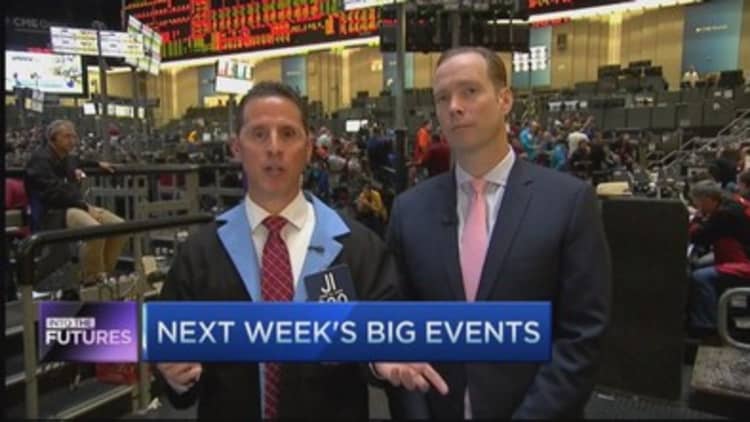
The bottom line of earnings season adds up to this: companies are running into big trouble with their top lines.
While companies generally tend to beat both earnings and revenue expectations, this year more have missed their first-quarter top-line estimates than beaten.
Out of the first 201 Index companies to report first-quarter earnings, only 47 percent have beaten revenue estimates, according to FactSet. If this number holds, it will be the first time that more companies have missed than beaten earnings expectations since the first quarter of 2013.
Now, analysts on the whole expect to see S&P 500 revenue fall 3.5 percent year-over-year, whereas they had expected just a 2.6 percent drop when the first quarter ended.
Meanwhile, earnings have surpassed analyst expectations nicely, with 73 percent of companies beating earnings-per-share estimates, according to FactSet. That's equal to the five-year average percentage of beats.
The surging dollar and sliding have certainly played a role in leading to this divergence.
Jumping over a lowered expectations bar
En masse, analysts appear to have underestimated the impact of macro factors on revenue numbers. However, companies that hedged their exposure effectively may not see profits drop due to the predictable impacts of macro factors.
That is, if the rising dollar does to profits what companies expected it would to revenue, then they will see the disappointment register on the top line. However, they can deal with the effect of the drop in sales before it hits their bottom line.
For instance, United Technologies reported that they saw 3 percent sales growth when currency is held stable, but that this growth was more than wiped out by 4 percent with of headwinds from the rising dollar.
Still, even though reported sales fell slightly compared to the year prior, United Technologies managed to grow net income by 15 percent, with considerable help from the $589 million in cash received from the settlements of derivative contracts, an amount equal to 40 percent of the company's revenue. (By contrast, the company paid out $113 million to settle derivatives contracts in the year-ago quarter.)
Read MoreBulls sniffing out an S&P breakout
These gains were "primarily related to the strengthening of the U.S. dollar versus the euro and Canadian dollar," the company explained in a note to its quarterly earnings filing.
On the whole, if companies desired to use currency worries as a means of lowering analyst expectations and consequently beating them, they seem to have succeeded.
"The negative currency impact on margins was way overstated due to negative corporate guidance, which resulted in big margin beats," wrote Jonathan Golub, chief U.S. market strategist with RBC Capital Markets, in an email to CNBC.
Either way, if the sharp currency moves continue or intensify as the Federal Reserve looks to raise rates, a peek at which companies are most effective at hedging their currency exposure will be helpful for investors.
"We knew going into this earnings season that the strength of the dollar was going to provide a revenue headwind," said Jim Iuorio, a trader with TJM Institutional Services.
"What I like about this is that it's easier to tell what companies are good at hedging foreign exchange risk and which companies are not," he said. "That should be a consideration when choosing which horse to bet on."
Still, Brian Stutland of Equity Armor Investments says that investors ignore disappointing sales that their own peril.
"The move higher in the U.S. dollar and the fall in crude oil is being seen as a one-time event negatively impacting revenue. Thus, the market is saying forward-looking revenue should come in line with estimates, as long as dollar strength and oil have run their course and stabilized," he said.
"That justifies holding the market flat as if this quarter is like a company taking a one-time corporate charge," Stutland added. But "I think it is a dangerous way to play stocks, because a future miss could cause quite a shock in the system."
In other words, if the problem with sales proves to be about more than the recent dollar strength and oil weakness, investors will get truly spooked.
—By CNBC's Alex Rosenberg.
Watch "Futures Now" Tuesdays & Thursdays 1 p.m. ET exclusively on FuturesNow.CNBC.com!



